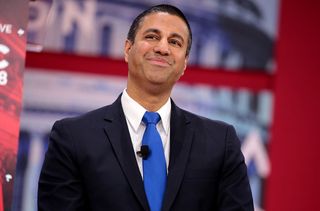FCC Chairman Ajit Pai calls California’s net neutrality rules 'illegal'
Ajit Pai had lots to say about California's recent net neutrality legislation.

California is trying to enact its own set of strict net neutrality rules, and if successful, other states could (and probably would) use it as a blueprint for passing similar bills. The only problem is that it's "illegal" to do so, according to FCC Chairman Ajit Pai.
Pai's stance on issue does not come as a surprise to anyone who's been following the situation. For those who haven't, here's a quick recap: In a 3-2 vote earlier this year, the FCC effectively reversed net neutrality rules that were implemented during the previous administration, paving the way for internet service providers (ISPs) and wireless carriers to largely regulate themselves. The only real caveat is they have to be upfront about things like throttling.
In the wake of net neutrality rules being rolled back, California and other states are attempting to restore the rules on a state level. The FCC foresaw this happening, and so it claimed the power to preempt state net neutrality rules in its Open Internet Order.
Whether the FCC has the power to preempt state net neutrality rules is something the courts will ultimately decide. In the meantime, California has forged ahead with a bill that implements even tougher restrictions than the original net neutrality rules, and all that is required at this point is a signature by the state governor.
"If this law is signed by the Governor, what would it do? Among other things, it would prevent Californian consumers from buying many free-data plans. These plans allow consumers to stream video, music, and the like exempt from any data limits. They have proven enormously popular in the marketplace, especially among lower-income Americans. But nanny-state California legislators apparently want to ban their constituents from having this choice. They have met the enemy, and it is free data," Pai said in a speech (PDF) at the Maine Heritage Police Center on Friday.
He also said that "efforts like California's are illegal," leaving little doubt that the FCC would challenge the state's bill. His comments didn't end there, however, as he further lashed out at California's lawmakers.
"Those who demand greater government control of the Internet haven’t given up. Their latest tactic is pushing state governments to regulate the Internet. The most egregious example of this comes from California. Last month, the California state legislature passed a radical, anti-consumer Internet regulation bill that would impose restrictions even more burdensome than those adopted by the FCC in 2015. In a way, I can understand how they succumbed to the temptation to regulate. After all, I suppose a broadband pipe might look to some like a plastic straw," Pai said.
The biggest gaming news, reviews and hardware deals
Keep up to date with the most important stories and the best deals, as picked by the PC Gamer team.
California's bill prohibits ISPs from blocking or slowing down websites or "whole classes of applications," like video. It also specifically prohibits ISPs from charging online services access fees to reach customers, a practice known as paid prioritization.
Those same consumer protections were part of the federal net neutrality rules that the FCC scrapped. However, California's rules takes things a step further by also disallowing ISPs from not counting certain content and websites they own against subscribers' data caps, a practice known as "zero-rating."
Pai's comments can be viewed as him wanting to get ahead of the situation, and perhaps put pressure on Governor Jerry Brown, a Democrat, to not sign the bill.
"Let me be clear: The Internet should be run by engineers, entrepreneurs, and technologists, not lawyers, bureaucrats, and politicians. That’s what we decided in 2017, and we’re going to fight to make sure it stays that way," Pai added.
Paul has been playing PC games and raking his knuckles on computer hardware since the Commodore 64. He does not have any tattoos, but thinks it would be cool to get one that reads LOAD"*",8,1. In his off time, he rides motorcycles and wrestles alligators (only one of those is true).
Most Popular






